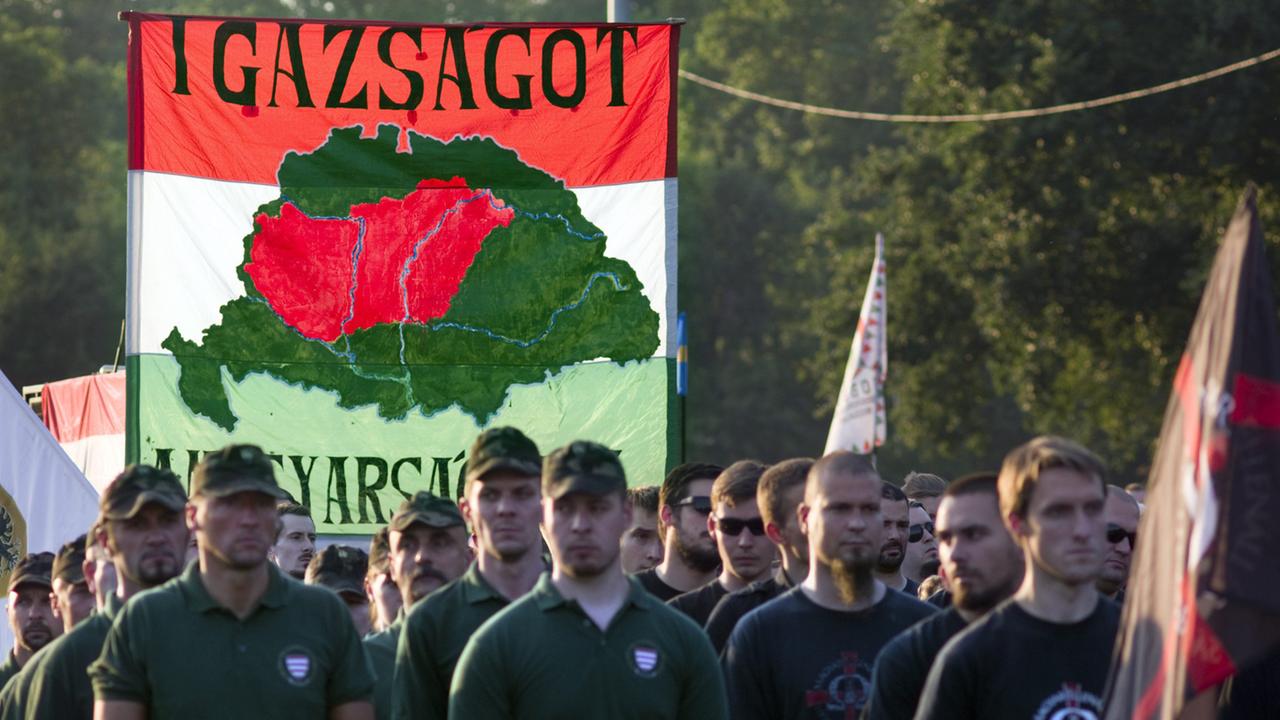Far-right parties in Hungary and Romania are making plans for a future in which Russia wins the war against Ukraine. Because then they want to divide Ukraine.
They stick on rear windows and park benches in Budapest – stickers that show the outline of Hungary. However, a Greater Hungary with the borders of 1920, before the division of the country in the Treaty of Trianon.
Part of this old Hungary is now Ukrainian territory, Zakarpattia. Around 1.25 million people live in the region in the far west of Ukraine, which is characterized by the Carpathian mountains. According to a census by the Ukrainian census in 2001, a Hungarian minority made up around twelve percent of the population here.
Hatched: territories occupied by Russia
“Hungarian Protectorate”
The leader of the right-wing extremist Our Homeland party, which received almost six percent of the vote in the 2022 parliamentary elections, recently outlined at a party meeting and on television the scenario of a Ukraine that is “no longer viable” on its own and only with the help of the European Union and the USA is kept alive.
“If there are political changes in these countries and the new governments no longer support Ukraine, then the state of Ukraine will cease to exist,” Laszlo Toroczkai explained his logic. At that point, the region in western Ukraine could ask Hungary for protectorate status and the Carpathians would then be returned to Hungary via a referendum, according to the scenario.
According to media reports from the 444.hu portal, the German AfD MP Petr Bystron also took part in the said party event.
Staging as the patron saint of Hungarian minorities
The Hungarian government is trying to smooth things over. Foreign Minister Peter Szijjarto emphasized that Hungary supports Ukraine's sovereignty and territorial integrity.
However, Professor Ulf Brunnbauer from the Leibniz Institute for East and Southeast European Research believes that the Fidesz government under Prime Minister Viktor Orban is not uninvolved in this newly sparked discussion. There has been a “Trianon trauma” in Hungary since 1920, according to which politicians and society still mourn the old Greater Hungary.
For years, Orban has portrayed himself as the patron saint of the Hungarian minority in the neighboring countries of Slovakia, Romania and Ukraine. As Prime Minister, Orban cannot make direct territorial claims. But he thinks it fits well that the extreme right is now making the topic socially acceptable again using Ukraine as an example.
Toroczkai, the chairman of the Our Homeland party, says what representatives of the Hungarian government simply don't dare say, said Brunnbauer. The government in Kiev is correspondingly skeptical. The signals that the Hungarian government has sent in recent years do not show that the borders have been accepted out of inner conviction.
Romanian right-wing extremists also want annexations
A similar development is also noticeable in neighboring Romania. There, a top politician from the right-wing extremist party AUR demanded that Romania should have a piece of Ukraine. Claudiu Tarziu, one of the AUR party leaders and candidate for the EU Parliament elections, gave a speech in Jassy at the end of January in which he called for the unification of Romania with the territories that were once part of Romania and are now part of Ukraine, as well as with the Republic of Moldova.
Last year, MP Diana Sosoaca, leader of the other far-right party SOS Romania, even introduced a bill into parliament calling for Romania to annex territories in Ukraine. Sharp criticism of the statements came from Romanian Prime Minister Marcel Ciolacu. This policy would only further the interests of the Kremlin.
Ukrainian parliamentarian and chairman of the Foreign Affairs Committee Oleksandr Merezhko then said that Ukraine's simultaneous territorial claims were a cause for concern: “This is exactly what Putin wants. I do not rule out that these statements are somehow coordinated.” He could not see any real reaction from the Hungarian and Romanian authorities to these unacceptable explanations.




